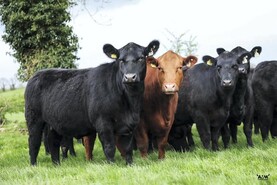The recent rain is helping build confidence in the store sheep and cattle trade following a difficult start to the season. Buyers have been nervous due to low fodder reserves and Brexit uncertainty, but there is growing optimism on the back of new grass growth.
The average price paid for 12- to 18-month-old steers in the four weeks to the end of the first week of August averaged 12% back on the year at £889/head. At the same time, steers aged six to 12 months dropped 9% compared with the same four-week period last year.
In the rings, steers have been averaging 204p/kg to 208p/kg at sales over the past week in the two Stirling marts, along with Lanark and Thainstone.
Robin Anderson, auctioneer at Castle Douglas Mart, told Farmers Journal Scotland: “Store cattle have eased back a bit. The decrease in the deadweight price is definitely having an effect on prime cattle prices but this could start to move up again if factory prices lift, which is expected.
“The scarcity of fodder is also having an effect; farmers are only going to buy stock for the fodder they have. It is going to be a sticky back-end,” admitted Robin.
Cattle quality key
“I can see there being more of a difference between quality, well-fleshed cattle and plainer types. There is always a difference but this year more so than any year. Quality cattle will always sell well but it could be difficult for more of the dairy-bred stock.
“Numbers are still looking relatively strong. For a sale at the same time last year we had 900 cattle and we will have up on 850 again this week,” Robin added.
National Sheep Association chair John Fyall was optimistic about the sheep trade this year. He said: “I am glad to see faith in the store sales as we kick off the season. Dingwall was a flyer this week and store sheep trade across the country has held up well.
“Abattoirs don’t seem to be looking for big volumes of sheep at the moment. They don’t want to be fuelling the fire by buying more lambs. However, with Eid round the corner, the demand is there. The QMS campaign will launch soon which will help home consumption. In the next few weeks we will see a bit more continental trade demand as well.”
“It’s positive for our trade that New Zealand are not focusing on the UK as an export market right now and Australia won’t have the numbers to send over here any time soon. So to any breeders questioning their future, sheep have shown the best gross margins in any part of agriculture in the last few years, and we are winning the environmental debate too. At the moment we have some of the cheapest sheep in the world so that that’s got to be worth somebody buying.”






 This is a subscriber-only article
This is a subscriber-only article









SHARING OPTIONS: